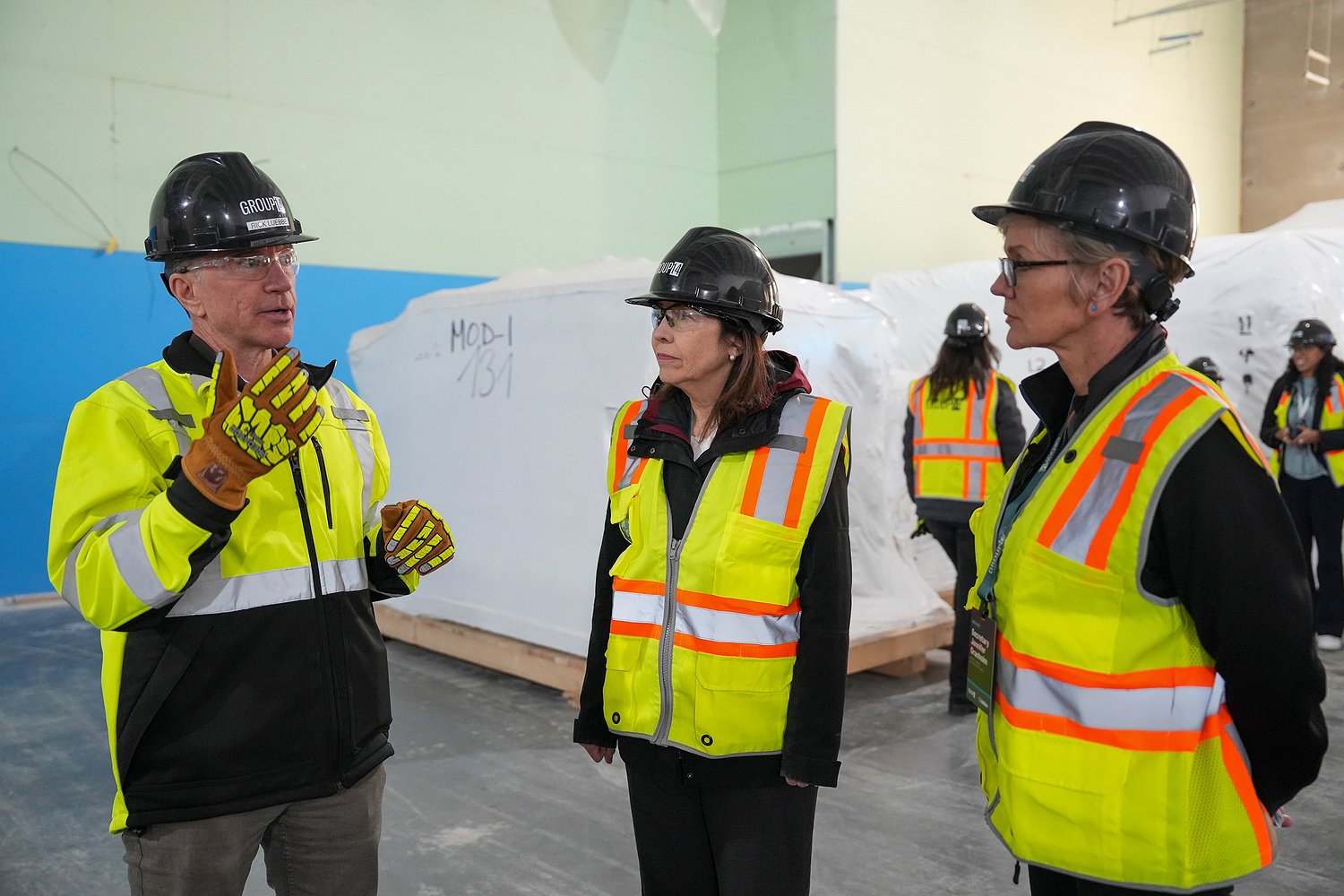Officials stress importance of independent green energy during Moses Lake visit
JOEL MARTIN | Hagadone News Network | UPDATED 2 years AGO
Joel Martin has been with the Columbia Basin Herald for more than 25 years in a variety of roles and is the most-tenured employee in the building. Martin is a married father of eight and enjoys spending time with his children and his wife, Christina. He is passionate about the paper’s mission of informing the people of the Columbia Basin because he knows it is important to record the history of the communities the publication serves. | February 26, 2024 5:31 PM
MOSES LAKE — Moses Lake has what it takes to be the hub of the Northwest’s clean energy technology, Sen. Maria Cantwell, D-Washington, said at a press conference Thursday.
“I think there's going to be a corridor, from Moses Lake all the way over to Coeur d’Alene,” Cantwell said. “That's what I think is gonna happen. And this corridor is also going to connect from Moses Lake to the Tri-Cities. What you're seeing is, in this whole area, guess what we have? We have ... a manufacturing workforce, we have a lot of land, we have cheap hydro and we have people who really understand energy technology.”
Cantwell was speaking at Group14’s BAM-2 facility in Moses Lake, which is under construction and expected to be the largest advanced silicon battery material factory in the world when it opens later this year, according to company-supplied materials. Group14 manufactures silicon battery materials that can increase the storage capacity of lithium-ion batteries like those found in both electric vehicles and smartphones, replacing less-efficient graphite, which must be imported from China.
“This new battery technology can power emission-free vehicles that will go farther, that will be the nation's cheapest. If you think about our electricity supply here, and the huge benefit that we have in Washington, it costs about the same to fully charge an EV in our state as it does to just buy one gallon of gasoline. And that's even before the technology that's going to come out of this facility. So that means you're going to help deliver something that's going to be even faster, and even more economical.”
Cantwell was joined by U.S. Energy Secretary Jennifer Granholm, who stressed the importance of American-made materials in battery technology.
“You guys were in the first wave of battery companies that we are seeing,” Granholm told the crowd. “But I have to tell you, although Moses Lake is creating this ecosystem where you have all of these battery companies coming, there's others happening across the country. You guys are making anodes, but we're making cathodes in Tennessee. We're making separator material in Indiana … We want all of the pieces in the United States, to be able to make sure that we are not relying upon countries whose values we may not share for a key component of our electricity energy source.”
Earlier that day, Cantwell and Granholm had joined Gov. Jay Inslee at Sila Nanotechnologies’ plant a few miles away for a round table discussion with local leaders. Both Sila and Group14 are the beneficiaries of $100 million grants from the US. Department of Energy to develop battery technology.
The technology is still in its infancy, Cantwell told the Columbia Basin Herald after the conference, and the Moses Lake facilities are still a work in progress.
“We want Moses Lake to help the whole nation change the game in electric battery manufacturing,” she said. “We want to say it's not all about Chinese battery technology, and that the United States can innovate faster, implement it faster and get it to customers. That level of innovation is our competitive edge because we can innovate on those anodes and make them more effective. So if we're right about that, and DOE is right about that and Group14 and Sila are right about that, that will be a game changer in the United States. There will be more jobs here in Moses Lake than we can fill.”
“We used to be, in the earlier part of the century, a nation that watched all of these manufacturing jobs go away,” Granholm said. “China bigfooted us on a lot of this technology, including on batteries and critical materials and processing of that. China processes 90% of the materials for batteries. And so the fact that we are bringing this capability back to the United States makes us a stronger nation … The U.S. is back, baby.”
Joel Martin may be reached via email at [email protected].
ARTICLES BY JOEL MARTIN

Space Burger booth open March 13-15
MOSES LAKE — Those who can’t wait for the Grant County Fair can get their Space Burger fix next weekend, according to an announcement from the Lioness Club of Moses Lake. The iconic Grant County sandwiches will be available at the Grant County Fairgrounds March 13-15, according to the announcement. There is no admission fee to get into the fairgrounds that weekend.

SENIOR EVENTS: March 2026
COLUMBIA BASIN — Plays, art shows, auctions and more await seniors in the Columbia Basin this month. Here are some opportunities to get out and about in March.

Valentine’s Day cards flood Brookdale Hearthstone with love
MOSES LAKE — Residents at Brookdale Hearthstone Assisted Living in Moses Lake got Valentine’s Day greetings from across the country last month. “I believe that the only states we have not received (cards from) yet are Vermont and Maine,” Lifestyle Director Imelda Broyles said Feb. 24. “We keep receiving new cards every single day. They have not stopped. My residents are in awe with every single one of the cards that we’ve been receiving.” The Hearts Across America project started as a way for children in school classrooms to exchange Valentine’s Day cards with classes in other states or even countries, but the idea has expanded to senior living facilities, according to the project’s social media.



